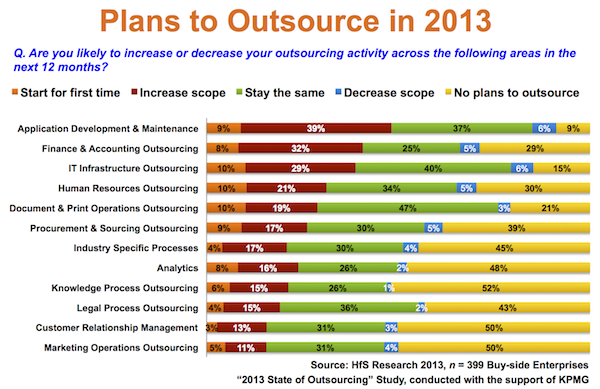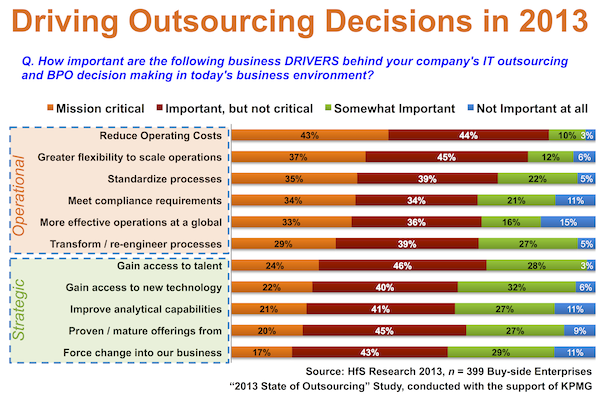
2013: A new dawn for a maturing outsourcing industry
Make no bones about it: 2012 was a pretty dire year for the industry known as “outsourcing”.
However, brand new data from our State of Outsourcing 2013 Study conducted with the support of KPMG, the largest-ever research survey focused on IT and business function outsourcing, clearly shows that the majority of enterprises are not only aggressively focused on increasing their outsourcing portfoilios, but many are now taking a more mature and realistic approach.
So, as always, let’s examine the facts…
How outsourcing got battered, bruised and vilified in 2012
- A painful presidential campaign that positioned outsourcing as an evil activity, despite the fact US IT unemployment is running at 3.8% and tech salaries have now reached 10-year record highs;
- A media desperate to jump on the fact that IT outsourcing must be in its death throes if GM’s Randy Mott was creating a few jobs on US soil;
- Pundits, consultants and “analysts” claiming outsourcing is yesterday’s strategy for our enterprises, without really being able to explain why, but eager to bury it under the negativity. Meanwhile, the fact that the great American innovator they love to laud, Apple, has been using Chinese children to manufacturer its wares, seems to escape practically unnoticed…
- The outsourcing industry itself calling for a re-brand to escape the negativity.
Why outsourcing is more embedded than ever in corporate operations strategy
1355 stakeholders across enterprise buyers, service providers and consultant/influencer organizations shared their views, observations and intentions for 2013 and beyond, when it comes to outsourcing IT and business processes. We are going to delve deep to share these dynamics with you in the coming weeks, but let’s start with the key dynamics – how fast is the industry growing, and what is driving the decisions:

399 major buy-side enterprises have spoken about their 2013 outsourcing plans, and barely a twentieth of them are looking to reduce their outsourcing scope across any IT or business function in 2013. Moreover, half of them are looking to increase their outsourcing of application services, four out-of-ten their finance and accounting, and a third their HR. In addition, there is a notable pick up in newer sourcing areas, such as analytics and legal.
The classical values of outsourcing are stronger than ever: cost, standardization and global delivery
When it comes to the decision drivers, it’s almost refreshing to see enterprises focusing on the basics: cost, global delivery and standardized process:

While, on the surface, this data isn’t exactly surprising, what it’s telling us is the vast majority of enterprises are eagerly looking to industry standard offerings as a priority. We’ve been lauding the old “ADP payroll analogy” for several years now, where there is little discernible business reason to run your payrolls yourself these days, and this is ringing true for the rest of the operational functions: being competitive with business operations is achieved by standardizing onto best-in-class processes. And to achieve that standardization is, really, quite straightforward – move these processes onto proven technology platforms and have them operated in a cost-efficient manner. For most organizations today, they’ve failed to do this effectively inhouse (through many years of pain and wasted investments) and shifting them over to a third-party has forced the issue and got them from A to C.
The Bottom-line: The tenets of outsourcing haven’t changed – it’s the simple fact that operations leaders have run out of excuses not to do it
The outsourcing debate used to be centered on the ability of enterprises and providers to do it right, to make the required cost savings with the appropriate amount of risk mitigation. This data finally, finally, renders that debate moot: the basic ingredients of outsourcing today are maturing and proven to work when executed effectively… the focus now shifts to the how enterprises can evolve into a globally sourced environment, not simply the should. Our next piece of analysis will zone into the core challenge of enterprise operations in 2013: how enterprises can alter their internal mindsets, attitudes and operational issues holding them back. Stay tuned…
Posted in : Business Process Outsourcing (BPO), Captives and Shared Services Strategies, Cloud Computing, Finance and Accounting, Financial Services Sourcing Strategies, HfS Surveys: State of the Outsourcing 2013, HR Outsourcing, HR Strategy, IT Outsourcing / IT Services, kpo-analytics, Legal Services Outsourcing, Procurement and Supply Chain, SaaS, PaaS, IaaS and BPaaS, Sourcing Best Practises, sourcing-change, Talent in Sourcing







Excellent data, Phil. This helps add clarity to a confused world that is struggling to come to terms with the global business we operate in today,
Frank
Hi Phil,
I couldn’t agree more with this article – the data is very revealing. Outsourcing is fundamentally functioning and it’s harder than ever for enterprises to ignore it as an extension of their global operation. I, for one, struggle to understand these articles that declare it is disappearing,
Amanda Hare
Phil – you know the answer from your great research- Outsourcing works!. adds value and moves organizations toward their strategic objectives. I’ve always said a part of the outsourcing providers role is to take the “anger” that comes with any change effort. You must accept the role of vilian in this business. Beyond Standardization of the process and tools is the simplification, mobility and improved user experience of outsourced services. keep up the good work,
John Gibson
It seems that polls have pointed to slower growth in outsourcing ever since the finacial crisis hit in late 2007. But the industry leaders keep thriving. So healthy demand is there – just not enough to satisfy all the players that crop up.
@ken – this is the only research that covers the enterprises who do the spending, as opposed to a handful of contracts. Yes, there is a reason why Accenture, Cognizant, IBM, TCS et al are making a lot of money, and it’s the shift in how enterprises are engaging third parties to manage operations and IT. But I do agree there are too many players in there… but it keeps it interesting 😉
PF
The industry as a whole is changing, how that change will continue to materialize is still to be determined no matter what the main stream media says, although keep in mind that perception is everything. I suspect one significant influencer of that change is the rise of viable hosted software (cloud, saas, etc.) solutions and their ability to offer multi-tenant, highly configurable solutions… or at least the perception of. Gone are the days of choosing between a monolith, expensive, client server ERP and an expensive, one size fits all outsourcing solution. Yes.. that is an exaggeration.
[…] new study from HfS Research and KPMG International finds little resistance to or plans to cut back on […]
[…] Source: http://www.horsesforsources.com/outsourcing-in-2013_01213 […]
[…] new study from HfS Research and KPMG International finds little resistance to or plans to cut back on […]
Interesting data points Phil! The debate in-house vs outsourcing has been going on from a long time, and with the presidential elections cloaking outsourcing as “evil”, it was all the more important to reveal the true picture.
The core objective of any business is to grow. To achieve this in today”s globalized, sophisticated and technology-driven world, companies will need to look for alternative sourcing and partnership opportunities–its not a choice but a necessity. In addition to the obvious cost advantage, outsourcing also provides strategic benefits such as access to a wider talent pool, global reach and delivery capabilties, specialized resources and processes, and faster time-to-market. It also allows organizations to stay “asset-light”, a key criteria in the post-recession era.
You might also enjoy our blog: http://www.minacsblogs.com/Vision2020/CrystalBall2013ACEOsViewofBusinessandOuts.aspx
that discusses the changing role of business process outsourcing service providers in 2013 and beyond.
In a world that demands aggressive investment and innovation, value partnerships with third party service providers can offer advantages that go beyond the traditional onshoring/offhsoring debate. Today “right-shoring” (choosing the most advantageous business model and the most optimum delivery location), is the new buzzword – a new face of outsourcing!
Phil — Excellent piece of work!
I wonder what strategies enterprises are adopting to harvest the value inherent in their Outsourcing contracts. Typically, companies get an annual technology plan from their Outsourcing services provider.
Enterprises need to develop a higher level of maturity and demand results beyond the annual plan and contract compliance — Innovation!
good insights and detailing . have shared with some friends in industry.. tnr
I don’t really understand why there’s should still be a outsourcing debate in the first place. It helps both entrepreneurs at the same time provides jobs to constituents of some developing countries such as Philippines.
Nice share, Phil!
You know what bothers me – it’s that outsourcing is put on a negative light because of all these media frenzy. Reality is, we are now living in a borderless economy where work is not anymore defined by place, but function. More people are working-on-the-go, outside the traditional office setting.. My point is, can we just stop using the word ‘out’ and ‘in’ — just call it plain ‘sourcing’.
Phil, you always manage to conclude everything nicely and smoothly. It’s actually enlightening to know some companies may have been affected with this post of yours and think about outsourcing. As what Tina Vargas says here, I also don’t understand why there are such arguments about this process. Outsourcing is proven to be effective once it is properly planned and implemented. Keep it up!
These are very good data points, that leave no doubt to the continuous development of Enterprise Management being more and more about Service Integration and Aggregation, rather than being limited by its own delivery capacities.
However, my current observation is that there is a big number of large outsourcing contracts coming to end of life over the next 2-3 years around the so-called developped countries.
Heads of strategy and sourcing are strongly re-considering if they shall re-conduct the contracts as they are ( at a lower price), if they shall re-open for a competitive bid at similar scope ( for QoS improvement) or fundamentally review the approach.
It seems that most of them are embracing a service line orientation and are considering to go for much heavier multi-sourcing, because of the application portfolio modernization and the surge of SaaS consumption.
This is a major shift on the market because of the impact on Enterprise governance, and the type of contracts that the providers will have to perform.
It would be interesting to gather some more extended data points and analytics about these trends to multi-sourcing.
Best
Eric
The data is highly interesting and revealing Phil! While I think Outsourcing is still intact, IT Management is considering bringing back some of their IT operations in-house. The importance of achieving a balance of the sourcing scenario is gradually becoming a priority.
As highlighted in the blog below, it is important to evaluate sourcing options and organizations are slowly starting to realize that.
http://www.metascale.com/insights/blogs/7-globalization-advisory/92-get-your-it-sourcing-mix-right
[…] To read this article, click here. […]
[…] and equally biased toward process efficiency and execution issues, which strongly supports our research findings that motivations of buyers are firm focused on cost reduction. Transformational ideas are going to […]
[…] We’ve got new data that shows the desire to standardize processes is very, very strong behind an outsourcing decision. […]
[…] new study from HfS Research and KPMG International reports that businesses in 2013 are continuing to rely […]
[…] for most enterprises. Considering most buyers venture into outsourcing seeking these initial “table-stakes” goals of cost-reduction, global scalability and process standardization, you have to give a healthy […]
outsourcing is somebody who is self-employed and is not committed to a particular employer long term. These workers are sometimes represented by a company or an agency . Freelance practice varies greatly. Some require clients to sign written contracts while others may perform work based on verbal agreements.
[…] this year, I read a Horses for Sources piece that mentioned that despite the rough time outsourcing had in 2012, Finance and Accounting […]
[…] When outsourcing just became a commonly acknowledged business strategy, it was viewed rather as a supplementing way of delegating non-essential work of a company. The very thought of outsourcing key functions to strangers, perhaps even located in other countries, seemed irrational at that time. Although some people still keep to this viewpoint, the reality is that outsourcing has risen to a new level of quality and trust between Employer and Contractor. More and more companies are outsourcing work or planning to do this in the nearest future – we can see that by merely skimming through latest outsourcing stats (Check out this 2013 survey-based report). […]